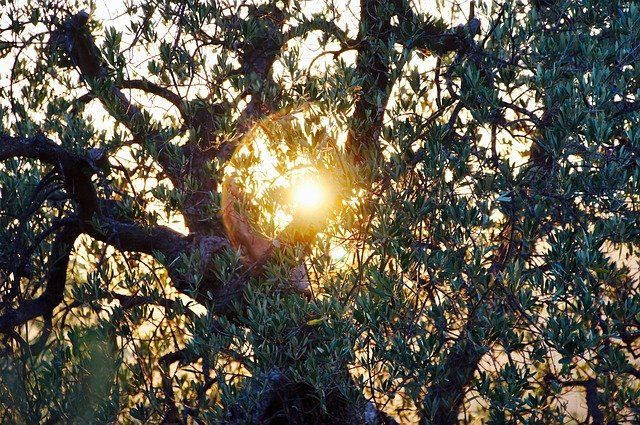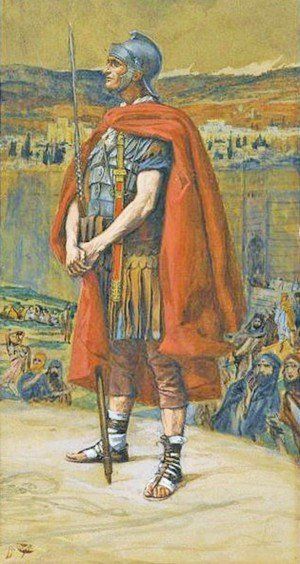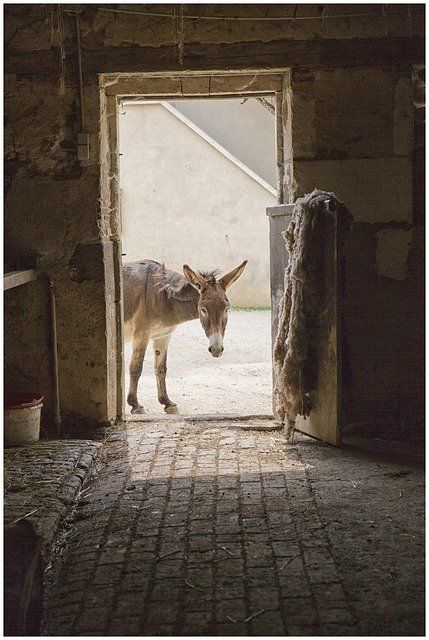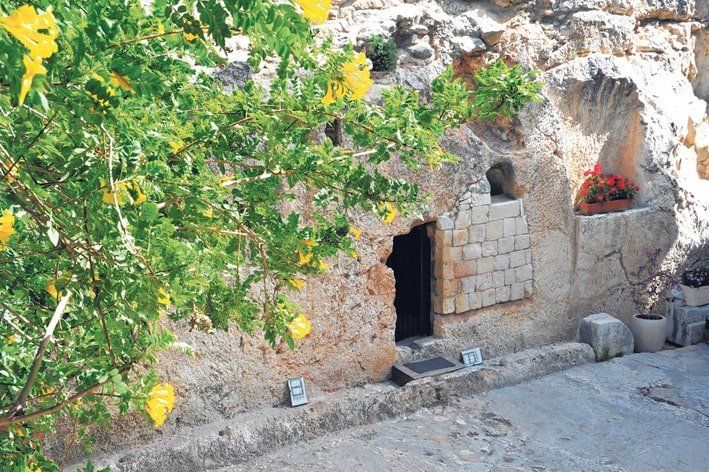He who was both human and divine, God manifest in flesh (1 Timothy 3:16), and had lain for two full days in ‘the dust death’ (Psalm 22:15) now in a brief moment was adorned with a ‘glorious body’ (Philippians 3:21).
Jerusalem slumbered in the final hour or so before the dawn. The bright yellow tip of the sun hovered coyly just over the horizon, giving notice of the light which would shortly swathe the landscape in the morning glare.
Some would have already been up and about. The narrow dusty streets however were unusually quiet, except perhaps for the sounds of a heavily-laden mule or two escorted by weary and impatient travellers, and possibly the scuffling of mangy dogs hidden away in dark alleyways. Soon the city gates, always shut at night for security reasons (Joshua 2:5), would be flung wide open heralding the busde of a new day.
Nearby was a beautiful garden, whose noted tranquility was in sharp contrast to the general cacophony of life inside the teeming city of Jerusalem. Profuse width an olive grove, a generous and colourful array of flowers and the sweet scent of blossom, the garden’s attractiveness belied the use its owner had intended for it. In a quiet shaded corner, hewn into the solid rock face, was a tomb.
Both the garden and the sepulchre were owned by a highly respected and wealthy member of the Sanhedrin (Judaism’s religious parliament), whose name was Joseph of Arimathaea (Luke 23:50-53). He had built the tomb for himself, where in death he could be as close to the holy city as possible; but on the night in question although it contained a body, it was not his.

The quiet resting-place
Shadows danced under the moon, and overhanging branches silhouetted grotesque shapes of various sizes. A gentle cool breeze wafted through the trees disturbing the stillness of the luxuriant foliage, the rustling of the leaves being the only sounds to break the silence of the night. Dawn bird song had yet to be heard.
Through the trees, close by the tomb, shadows of a more recognizable kind could have been detected. Whispers, too. At least two men, probably temple guards, paced to and fro alongside the large boulder which effectively sealed the opening to the sepulchre. They did so, no doubt in an attempt to keep warm, rather than in anticipation of any trouble. It would not have been a duty which their comrades would have envied, keeping watch over a corpse in such eerie surroundings.
The reason for their being present at such a time was due to the suspicions of the Sanhedrin, bothered by the claims of the ‘deceiver’ Jesus of Nazareth that on day three after his death he would rise again. Of course, they did not believe it, but just in case his disciples stole the body to make a resurrection look authentic, they were anxious the sepulchre should be ‘sure proof’ against any possibility of trickery. Therefore, certain high-ranking members of the Jewish council had gone to the Roman governor Pontius Pilate about the matter, and he for once agreed with them. Permission was granted for the unusual request, and the guards were marched to Joseph’s private garden (Matthew 27:62-66).
Within the tomb

As the men rubbed their hands, or hugged themselves, to keep out the chill early morning air something astonishing was about to occur. Had they been told about it, or even the entire world, it would have been impossible for them to believe it. Within feet of them, beyond the huge rock rolled into plac
e along the gully made for it, death was on the point of giving way to resurrection. The boulder separated eternal power from human impotence and frailty, belief from unbelief.
Bitterly cold darkness filled the tomb, a small cave with a narrow and low entrance and limited space within, and a roof just lofty enough to prevent the average-sized man from stooping. The floor was solid stonework and served to intensify the freezing bleakness of the confined area. Cut into the furthest wall was a rocky niche upon which could be detected the shape of a body. It was wrapped in a white linen cloth, and a separate ‘napkin’ bandaged the head. In the silence it was as if time hung suspended.
The stillness was in no way disturbed when, with the suddenness of a wink (1 Corinthians 15:52), a figure dressed in white light appeared as if from nowhere; then another, equally dazzling (Luke 24:4). They made no sound, not even to speak to each other, but stood at either end of the rocky slab upon which the motionless form lay, and gazed down intently upon it. No ‘mercy seat’ was complete without accompanying cherubim (Exodus 25:21-22).
The power was not invested in them for what happened next, they were present merely to bear witness to it as God’s law demanded (Deuteronomy 19:15), to minister as was their heavenly calling (Hebrews 1:6-14), to herald the glorious event and as messengers to explain what had occurred to frightened mortals (Luke 24:5-8). That was all.
The world was not present, any more than it was the night Christ was born. Then Joseph and Mary, together with some animals, had been the sole spectators of the event foretold for centuries past. How sought-after would be those who had witnessed the creation of all things, how many would be the questions asked, how few the doubts from those who listened awestruck! Even more to be envied were the two humble people from Nazareth, who were within inches of the Creator ‘made flesh’ entering the world he had created (John 1:14).

If a lowly stable, with the dirt and smells, harboured the exquisite beauty of the virgin birth of heaven’s favoured son (Isaiah 7: 14), now a cold and dank tomb acted as the ‘womb’ from which the blessed hope of resurrection was about to spring forth. Humankind was not required now, only angels graced the occasion with their presence, for resurrection unlike birth is the business of heaven alone.
Nobody knows what time it was, heaven overshadows time during angelic visitations, but at a divinely-given moment as the incarnation had been (Galatians 4:4), the swift messengers silently went about their appointed tasks. First the head cloth was unwound, being more easily accessible, and neatly folded and placed tidily to one side. Then, together, they tenderly removed the white linen grave clothes supplied by Joseph and his fellow believer and councillor Nicodemus at the burial of their Lord (John 19:40). These were also folded carefully, and placed in a separate pile from the ‘napkin’ (John 20:6-7).
There was a reason for such orderliness. Grave robbers, unlike God, never do things ‘decently and in order’, being always in a great hurry! (1 Corinthians 14:40). In other words, heaven made sure nobody in all honesty could say the disciples (or anyone else) had stolen Jesus’ body (Matthew 27:64). In any case, the cold and tired guards approaching the end of their shift were satisfied they had kept all intruders at bay!
The body having been unclothed and rid of the spices which had adorned it (John 19:39), the two silent figures dressed it with utmost tenderness and grace in a robe they had brought with them from heaven. Within the framework and limitations of time, no garment sown by woman, however fine the cloth or efficiently made, could hope to equal the glory eternity was soon to display within that solitary place. Besides, even this world’s most reputable tailor would be unable to design an outfit capable of passing through walls! (Luke 24:36). Their task having been accomplished the two heavenly sentinels returned to their positions at either end of the corpse, mere spectators of what was to follow, for they had inadequate powers and even less authority to share in the remarkable transformation about to take place. All they could do was observe, together with the innumerable citizens in heaven (Revelation 7:9), and rejoice as they had done at the glorious incarnation, in the majesty of almighty God and the vindication of the divine plan (Luke 2:14).
The moment of resurrection
Profound mystery pervaded every recess of that sacred spot, the penetration made possible only by ultimate Mind and he who possesses ‘the keys of hell and of death’ (Revelation 1:18). Suddenly, the glow generated by the angelic presence was superseded by a candescence which swathed the cave’s interior with brilliance, sweeping aside in an instant all vestiges of darkness and chill. A display of God’s splendour can never be sheltered by shadow, the cry will always arise, ‘Let there be light’ (Genesis 1:3).
He who was both human and divine, God manifest in flesh (I Timothy 3:16), and had lain for two full days in ‘the dust of death’ (Psalm 22:15) now in a brief moment was adorned with a ‘glorious body’ (Philippians 3:21) – one not limited by time, but capable of elevation above and beyond it. The impotent passivity of the once crumpled form, with its sallow flesh, languid expression, hollow eye sockets, sagging mouth and twisted arms and legs, gave way to a rapid surge of divine strength. Death’s sickly pallor surrendered to the radiance of death defied, the power of darkness (Colossians 1:13) to the power of an ‘endless life’ (Hebrews 7:16).
Yet, the mystery deepens! Christ, although different, was as recognizable lying on the rock shelf aglow with glory as he had been hanging on the cross. The viciousness of crucifixion could still be seen, lacerated hands and feet (Psalm 22: 16) and the spear thrust gash (John 19:34), because these are what stimulate heaven’s eternal acclamation: ‘Thou art worthy – for thou west slain, and hast redeemed us to God by thy blood out of every kindred, and tongue, and people, and nation’ (Revelation 5:9). The national anthem of the new Israel! For that reason the fleshly mutilation, glorified flesh, will everlastingly remain (John 20:27).
The hope of centuries rested in what happened next. Within the silent realm of the tomb, where sound is a stranger, could be heard the whispered intake of breath. What then; the stirring of a finger, a foot, an arm? Curiosity is idle speculation. One thing is certain. Like someone ascending from the depths of the blackest and deepest of pools, his head thrusting through the surface into the brightness of daylight, Christ opened his eyes! It was a simple act, but the most profound known to mankind, that death’s ominous finality could be overcome. His two angelic companions rejoiced, the living no longer needing to be sought among the dead (Luke 24:5). Heaven had burst into that small space. He is risen!
The boulder removed

Outside, the guards waited impatiently for the dawn to break, and their due to end. It had proved an uneventful night! They little realized that at that moment the Son of God was walking towards the entrance of the cave, blocked by the giant rock, no longer a hindrance to him. He was not a ghost, but his was an experience which soared beyond the finite, where physical considerations no longer held sway. He could have entered the garden leaving the boulder in place, but the world had to be made aware of the awesome power of God and the triumph of his risen Son.
They did not have long. He who had twelve legions of angels at his immediate command (Matthew 26:53) required only one to fulfil his purpose. He swooped from heaven, the vanguard of a ‘great earthquake’ concentrating its intensity upon the small tomb (Matthew 28:2).The guards collapsed, the garden trembled, the birds scattered in every direction, and the boulder having rumbled away the early morning air gushed into the tomb now emptied of its precious occupant. All that remained were the angelic witnesses (Deuteronomy 19: 15), who waited for the first visitors to arrive, while among the trees the shadow of a man could be seen.






